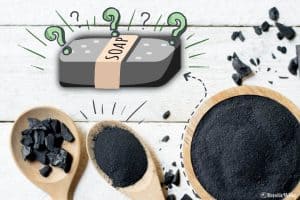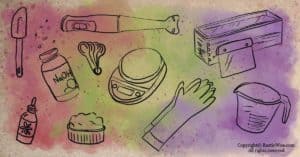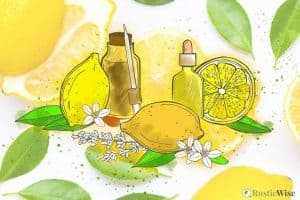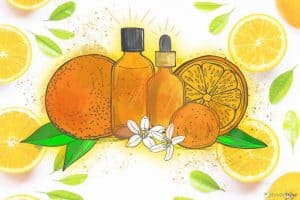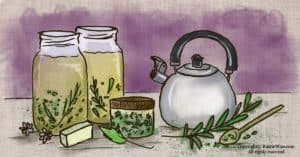What Is Mild Soap for Cleaning? Here Are 9 Ways To Use It

If you’re looking to clean around the house, but don’t want to use harsh chemical cleaners that can irritate skin or release fumes, you’ll want something milder. So, what is mild soap? Mild soaps or detergents are formulated to be gentler on skin and don’t contain builders, or other harsh ingredients such as chlorine bleach or ammonia.
There are many types of gentler soaps that are designed for different purposes. Some have a specific purpose, such as laundry detergent, while others can be multi-purpose.
An example of a mild multi-purpose soap is liquid dish soap. Not only can it get those dishes sparkling clean, we can also use it for cleaning around the house—all without irritating your skin.
Read on to learn more about the differences between mild soap vs. heavy-duty cleaners, benefits of using mild soap, and how you can make the most of mild soap around the house.
Roll up your sleeves, and let’s begin!
What is mild soap for cleaning, exactly?
There’s no standard definition of the term “mild soap” but for cleaning, it means soaps or detergents that are safe for hand washing lightly soiled items and contain little to no builders.
What are builders?
Builders are chemical cleaning compounds added to heavy-duty solutions to enhance the cleaning ability of surfactants.¹ Namely, builders help in three main ways:
- Softening: Builders soften water by neutralizing metal ions such as calcium and magnesium.
- Buffering: Builders help to increase the pH level of a solution, making it more alkaline, which boosts cleaning power.
- Emulsifying: Builders break up or emulsify oil and dirt particles into tiny “globules” and prevent them from settling back onto a cleaned surface.
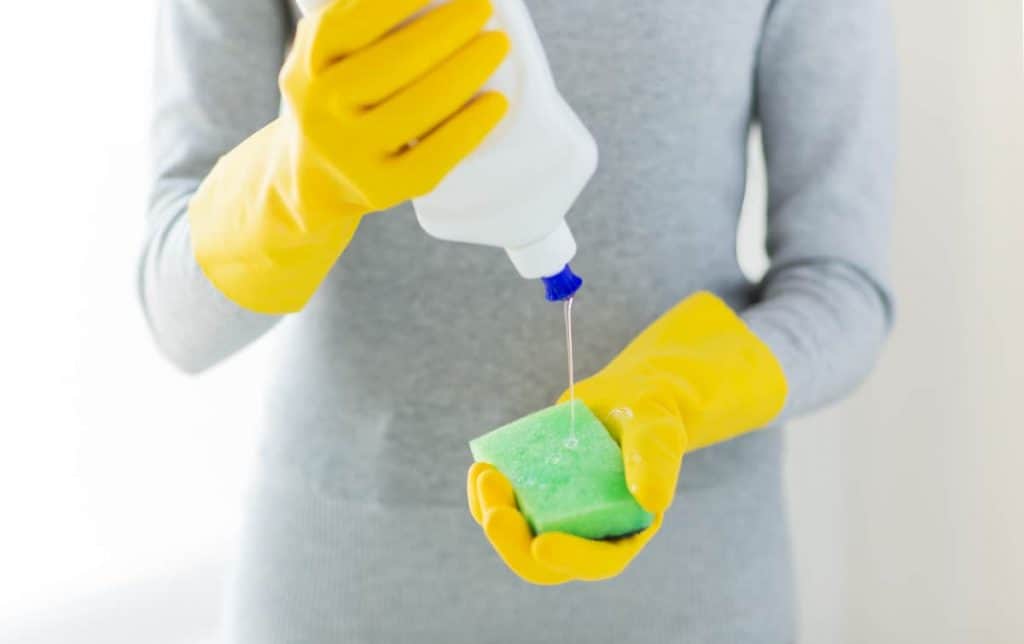
While these characteristics sound great for cleaning, they come at a cost, namely harsher chemicals that may affect the environment and your health.
So, what’s an example of mild soap?
A liquid hand washing soap is an example of a mild soap that’s useful for more than just washing dishes.
The American Cleaning Institute (ACI) defines a light duty detergent as:
“An un-built or infrequently low-level-built, detergent-based washing product designed for light cleaning tasks, especially hand dishwashing. While not made for general laundering, it does find use in hand washing lightly soiled, delicate garments, and in household cleaning tasks where ability to handle heavy soil is not required. Originally introduced as granules, today’s light duty detergents are usually liquids. Emphasis in formulation is on hand dishwashing, which places a premium on a product’s ability to handle all food soils, its mildness to hands, plentiful long-lasting suds, and rinsing that leaves surfaces free of film and spots. Light duty detergents are based principally on anionic surfactants, which are generally high sudsing, but they may also contain some nonionic surfactants. Other commonly used ingredients are ethyl alcohol, suds boosters and stabilizers such as acyl or fatty acid ethanolamides, opacifying and/or colorant agents, and fragrance.” ²
Tip: If you have want to avoid irritating your skin, opt for mild soap labelled as free of artificial fragrances and dyes.
Is there a difference between soap and detergent?
While the terms “soap” and “detergent” are used interchangeably, they technically mean different things.
The U.S. Food and Drug Administration (FDA) defines soap as the product you get when, “…combining fats or oils and an alkali, such as lye.”³ This mainly refers to handcrafted soaps made using either the cold process or hot process methods.
Most so-called soaps you can find on store shelves are actually detergents. This includes shampoos, laundry detergent, hand soap (both liquid and bar soap), and dishwashing detergent.
Both soap and detergent clean.
Traditional soap is made from natural ingredients. This includes vegetable oils such as olive oil, coconut oil, and palm oil, or animal fats such as lard or tallow. When mixed with lye, these oils saponify, a fancy term which means they turns into soap.
Where they differ is that detergents use synthetic surfactants (or surface active agents) by reducing the surface tension of water, making it easier to spread across surfaces and remove oils and dirt. Detergents are designed to work well, even with hard water.
Common mild soap surfactants include sodium lauryl sulfate (SLS), or sodium laureth sulfate (SLES). These surfactants create bubbly lather and work effectively to remove grease and dirt particles.
Surfactants are milder than common chemicals used as builders.
What’s the difference between mild soap for cleaning vs. heavy-duty cleaners?
The major difference between mild detergent for cleaning vs. heavy-duty cleaners is the lack of builders in the former. Let’s look at some common builders found in heavy-duty detergent.¹
- Phosphates: You’ll often see sodium tripolyphosphate (STPP), listed on the ingredients label of an industrial detergent. They work to hold metal ions. Phosphates are linked to adverse environmental conditions such as harming waterways and animal life. Most dish soaps on the market today don’t contain phosphates anymore.
- Sodium carbonate (soda ash): Used as a water softener, soda ash may hurt eyes or skin when in direct contact in a concentrated form.
- Sodium silicate: Works to prevent corrosion. When inhaled, sodium silicate may harm the respiratory tract.
Benefits of using mild soap for cleaning
As gentle soap doesn’t contain many of the harsher chemicals found in heavy-duty cleaners, it causes less skin irritation and doesn’t release harmful fumes. This is especially important if you or a family member suffer from asthma or allergies.
Besides health concerns, harsh cleaners are also hard on the surfaces you’re cleaning. You may find that after scrubbing, the surface may look faded or worn-down.
The U.S. Environmental Working Group (EWG) looked at over 2,000 commercial cleaning products and found that many of the products contained ingredients that are linked to adverse health conditions:
- May trigger asthma: Some ordinary cleaning products may trigger asthma, or difficulty breathing in people who did not previously have asthma.⁴
- Release of toxic chemicals: The EWG discovered that some household cleaning solutions contain harmful ingredients such as 1,4-dioxane (a carcinogen in high amounts), and formaldehyde.⁴
- May cause burns or poisoning: In worst-case scenarios, when strong cleaning products are misused, you may experience skin burns, poisoning, or experience allergic reactions.⁴
The takeaway: Gentle soaps are better for your overall health and the environment. You won’t have itchy skin, and may experience less dryness after using milder soaps. You may experience less skin inflammation and keep skin hydrated.
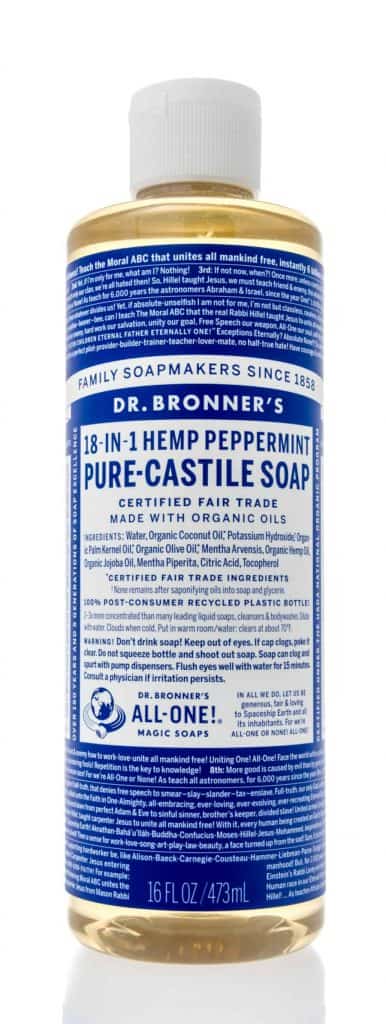
Credit: ©homank76/123RF.com
Best mild soaps to use for cleaning
Here are some of the best mild soaps to use as a regular detergent around the house for everyday cleaning tasks.
Dish soap
Liquid soaps for hand washing dishes are one of the most versatile detergents for regular cleaning. Liquid commercial soaps for dishes are often formulated to be gentler on skin.
The New York Times tested 28 various hand dishwashing detergents, and found that the best overall soap is Seventh Generation Dish Liquid. It boasts cleaning power, as well as eco-friendly ingredients (no fragrances), is made sustainably (no animal-testing), all at an affordable price.⁵
The runner-up is Dawn Ultra Original Scent Dishwashing Liquid Dish Soap, as it has great cleaning effectiveness, but contains artificial dyes and fragrances which may irritate skin.
We can use ordinary dish soap for many purposes around the house from mopping floors, cleaning walls, and as an all-purpose cleaner. Simply squirt a few drops of liquid dishwashing soap into warm water to make your own cleaning solution.
Castile soap
Castile soap traditionally meant a pure olive oil soap, but nowadays, most liquid Castile is made of a blend of vegetable oils. This may include palm oil, coconut oil, and olive oil.
Mild and free of synthetic detergents and preservatives, Castile soap (in bar or liquid form) is a popular choice amongst the eco-conscious crowd.
Dr. Bronner’s a popular brand, markets its pure Castile soap as a “18-in-1” cleaner. It’s safe for hands, body, hair, laundry, mopping, dishes, and more.
To use a pure Castile soap, you make a diluted solution depending on what you’re using it for.
Tip: To make an all-purpose cleaning spray, combine ¼ cups (60 milliliters) soap in 1 quart (1 liter) of water in a spray bottle. You can also add ¼ teaspoons (1.25 milliliters) tea tree essential oil for its antimicrobial properties.
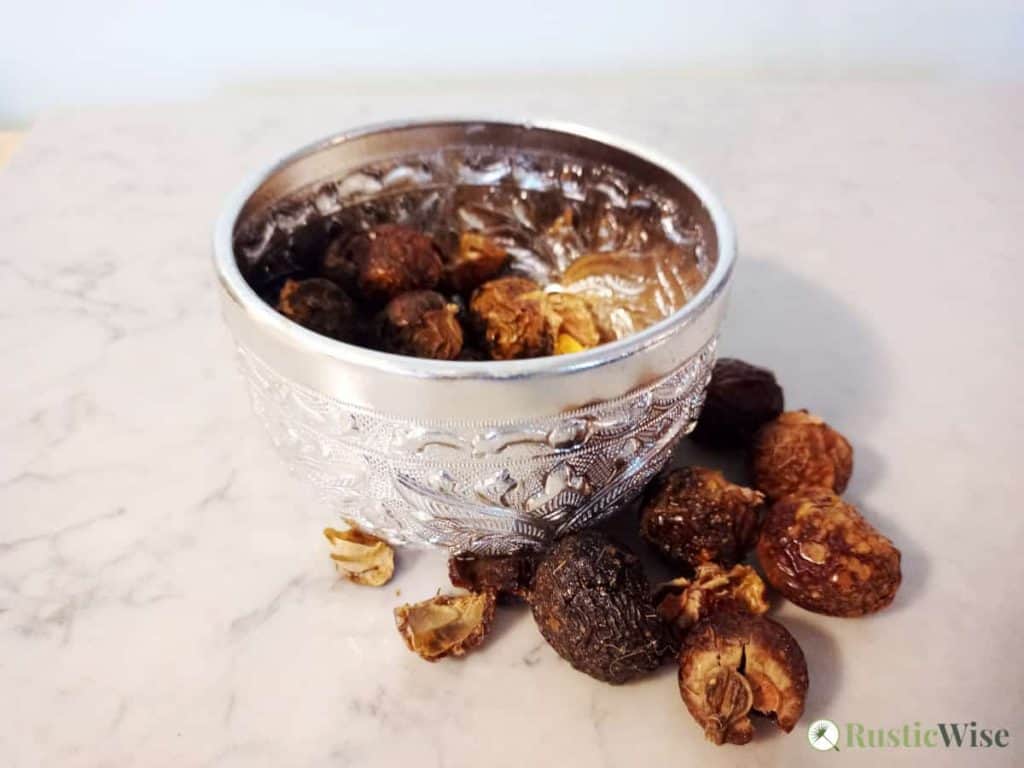
Soap nuts
Soap nuts are the dried fruit or berries of the soapberry tree, which is a deciduous tree or shrub that belongs to the genus Sapindus. Also known as soapberries, these small dried fruits contain natural saponins which lather when in contact with water.
Many people use soap nuts as a natural laundry detergent. It’s a gentle fabric cleanser with no harsh chemicals.
You can also use it as a natural shampoo, or make an all-purpose cleaner.
Tip: To make a soap nut all-purpose cleaner, boil 5–10 soap nuts in 2.5 cups of water. Let the solution simmer at a gentle boil for 10–15 minutes. Let the solution cool before transferring to a spray bottle. Keep your soap nut cleaner in the fridge for up to 2 weeks.
When should you use mild soap?
My personal ethos is to use mild soap FIRST (for almost everything) to see if it does the job before breaking out any harsher, heavy-duty cleaners, or a strong detergent.
Why?
Often, all that’s really needed to clean is a good soak beforehand with mild soap combined with a bit of elbow grease. We often resort to heavy-duty cleaners as a default.
(It also helps if you’re using an appropriate cleaning cloth or scrubber!)
Sure, there are definitely times when bleach or another suitably strong cleaner work best. But not always.
Unless you have some heavy-duty cleaning to do, try some mild soap first! Here are nine ways to use mild soap for cleaning.
- Cleaning jewelry: Use a few drops of mild liquid dish soap (such as Dawn) and warm water to naturally clean silver, gold, or platinum jewelry.
- Carpet cleaning: Spot clean grease stains on carpet using Castile soap (or liquid dish soap) and vinegar and a few drops of your favorite essential oil. Spray the solution on the oil stain and let sit for 30 minutes. Scrub with a stiff brush.
- Patio furniture: Fill a large bucket with a gallon of warm water and a few squirts of Castile soap or dish soap. Brush aside those cobwebs, and use an old rag or a Swedish dish cloth to wipe down grimy or dusty patio furniture.
- BBQ grill: For tough, stuck-on food and grease, make a strong solution of dish soap and warm water, and let your barbeque grill rack soak for 30 minutes. Follow up with a scrub using a wire brush.
- Wipe down kitchen cabinets: Dish soap is not only good for removing grease from last night’s lasagna pan, it can also help de-grease the face of kitchen cabinets and cupboards.
- Unclog a kitchen sink: Before you reach for that bottle of chemical-laden drain cleaner to unclog your kitchen sink, pour 1/2 cup of Dawn soap down the drain. Let it sit for 5–10 minutes. Follow up with a hot water rinse. Most kitchen sinks are clogged with food particles. Dish soap helps to break apart grease molecules.
- Clear a clogged toilet: For those annoying and stubborn clogs within the toilet’s trap, try dish soap and hot water.
- Clean walls: Liquid Castile soap or ordinary dish soap works well when mixed with a bucket of warm water to remove fingerprints or smudges and keep your walls spic-and-span.
- Laundry: You can find milder commercial laundry detergents labelled as “free and clear.” These solutions are free of fragrances and dyes which can irritate sensitive skin. You can ditch the liquid laundry detergent in favor of soap nuts, a mild and effective cleanser that’s great for sensitive skin.
The final word: what is mild soap for cleaning?
Mild soap for cleaning is any detergent that is gentle on the skin and doesn’t contain builders found in heavy-duty cleaning products. A few good, multi-purpose mild soaps are liquid dish soap for handwashing, Castile soap, and soap nuts.
Mild soaps are great for anyone with sensitive skin, eczema, and other skin conditions. There are many options for mild soaps including liquid soaps and bar soaps. If you’re looking for a mild soap, look for words such as “mild”, “gentle”, “hypoallergenic”, and “for sensitive skin.” These will help you find a soap that is right for you.

References
- Essential Industries, The Chemistry of Cleaning – Builders, https://www.essind.com/the-chemistry-of-cleaning-builders/. Accessed January 2022.
- The American Cleaning Institute (ACI), Ingredient Glossary, https://www.cleaninginstitute.org/understanding-products/ingredients/ingredient-glossary. Accessed January 2022.
- U.S. Food and Drug Administration (FDA), Frequently Asked Questions on Soap, https://www.fda.gov/cosmetics/cosmetic-products/frequently-asked-questions-soap. Accessed January 2022.
- U.S. Environmental Working Group (EWG), Cleaning Supplies and Your Health, https://www.ewg.org/guides/cleaners/content/cleaners_and_health/. Accessed January 2022.
- Boerner, Leigh Krietsch (07 September 2016). “The Best Dish Soap,” Wirecutter/The New York Times, https://www.nytimes.com/wirecutter/reviews/best-dish-soap/. Accessed January 2022.

Author: Theresa Tesolin
Theresa is co-founder of RusticWise. She helps people unleash their inner DIY spirit by encouraging them to get dirty and make or grow something from scratch.


